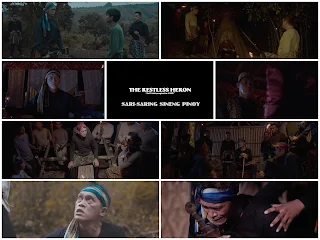Communication is vital for human existence. Unfortunately, we live in a continuously isolating world, partly by choice and partly by global circumstances. How often are you truly sitting down with one or a few other people and having a lengthy discussion that's not about simple trivialities? My guess is not often. As a substitute, we absorb discussions of others. Just look at the rise of podcasts. People spend hours upon hours listening to people talk about politics, film, sex or any number of topics.
About Us But Not About Us (October Train Films, The IdeaFirst Company, Quantum Films, 2022) satiates that desire better than any podcast can hope for because it is cinema. Having these precise visuals captured by Jun Robles Lana along with the discussion forces you to give it your complete attention. You may listen to an audio version of the film, but would miss out on the emotion and context of the conversation. Being at that restaurant with Eric (Romnick Sarmenta) and Lance (Elijah Canlas) is just as powerful as hearing what they have to say. This is a film that manages to be both bold and simple. It's an idea that seems like something anyone could come up with but almost nobody would think to try.
About Us But Not About Us may just be a film about two men talking to each other over brunch, but they find more to say in five minutes than other films do in their entire running time. You might think that watching two men talk and eat for an hour and a half could be tedious, but this is a more invigorating and thought-provoking brunch you ever had. What the film exploits is the well-known ability of the mind to picture a story as it is being told.
About Us But Not About Us never, ever, becomes a static series of two shots and closeups, but seems only precariously anchored to that restaurant where Eric argues, it is simply not necessary to go find the truth.
In watching About Us But Not About Us, it becomes clear how much of Lana’s narrative sleight-of-hand is made possible by Romnick Sarmenta's remarkable performance. All good actors are capable of externalizing emotion, but few can show a character shielding what we sense is inside — few can indicate a nucleus of truth that the film itself never speaks. Sarmenta is the rare star who’s able to turn that sense of withholding into his most powerful asset. It’s not only because the camera loves him, but also because he’s withholding something from the rest of the world in a way that makes you want to lean forward and learn his secrets. From the start, Sarmenta’s downcast gestures and weary remove have a way of complicating his character’s outward self-interest, as if Eric has spent a lifetime walling off his heart in order to survive. Yet when Lana reveals the truth, it’s Sarmenta’s broken smile that lets the character’s devastation seep onto the surface. With minimalistic body language, he conveys an inner cavity of pure need enough to make you reconsider the fundamental nature of romantic love. Elijah Canlas shades his character’s stubbornness with layers of pain he’s never been taught how to express. Lana's screenplay deprives Lance the comfort of being right forcing him towards a kind of ambiguity that young men have to seldom sort through. It’s in these strained moments that Canlas' performance allows us to see the cognitive dissonance that’s driving his character’s actions. The more that circumstances spiral out of Lance's control, the more Canlas grips on to the serrated edges of his role, the easier it is to appreciate the urgency with which Canlas is trying to find it for the first time. Grief, anxiety and rage build up in a pressure cooker until it inevitably detonates.
Sound: Armand de Guzman
Music: Teresa Barrozo
Film Editor: Lawrence S. Ang
Production Designer: Marxie Maolen Fadul
Director of Photography: Neil Daza
Screenplay: Jun Robles Lana
Directed By: Jun Robles Lana










